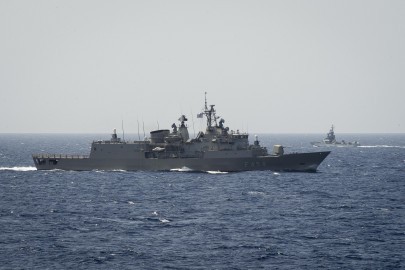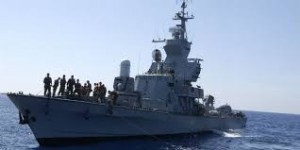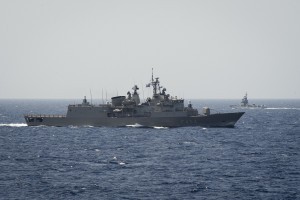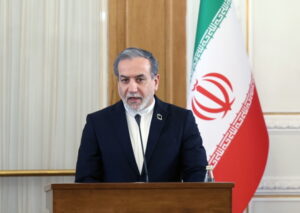The trilateral Noble Dina exercise between the American, Israeli and Hellenic navies will begin later this month, with nearly a dozen surface ships, submarines and related air assets scheduled to engage in joint reconnaissance, counterterror and antisubmarine warfare training.
Cyprus will participate as an observer in the annual three-way drill, which begins in Greece and will conclude in mid-April here at the Israeli Navy headquarters in Haifa, said Commander Assaf Boneh, the head of international cooperation for the Israeli sea service.
“It’s one of our most important exercises that allows us to hone our proficiencies in very complex scenarios,” Boneh told Defense News. “We’ll be training in a vast area from Greece to Israel, and this gives us a lot of room to practice multiple scenarios that require jointness.”
The Israeli officer said the ongoing civil war in Syria and expanding activities related to offshore energy discoveries are intensifying interest and presence in the Eastern Mediterranean by many nations in Europe and beyond. The Israeli Navy, according to Boneh, aims to tap into this augmented interest and presence for purposes of expanding cooperation and international exchanges.
“The situation in Syria makes this area very interesting for a lot of navies. That’s why you can find here the French Navy, the Italians, the British and many others who are looking for safe ports to come and rest, train and resupply. So all this gives us good opportunities to expand our cooperation beyond Greece, Cyprus and the U.S., which is by far our largest and most important partner,” he said.
One Navy with whom Israel does not plan to expand cooperation — at least for the foreseeable future — is the Russian Navy, which has persistently projected its seapower in this area over the past two years.
“There is a channel of communication with the Russian Armed Forces, coordinated especially for preventive safety reasons. They are here in these waters. Obviously we are very active here. And so it’s important to have communication. But beyond that we should remember to preserve and maintain our own national interests,” he said.
Turkey, in contrast, is an important regional power with whom the Israeli Navy hopes to resume close cooperative ties, said Boneh.
“As Turkish-Israeli relations are returning to normalcy, I hope in [the] future that we can go back and do routine exercises,” he said. “They are here. We are here, and we in the Israel Navy are looking forward to a more positive and brighter future regarding cooperation.”
(The Hellenic Navy Psara, F-454, front, sails past the Israeli Navy Keshet, Saar 4.5, while transiting the Mediterranean Sea as seen from the bridge wing of the U.S. destroyer Porter during Exercise Noble Dina on April 4, 2016)
For more than a decade prior to the rupture of ties following the May 2010 so-called Mavi Marmara affair, Turkey was a routine partner along with the United States in two major trilateral maritime drills: the Noble Dina that begins at the end of the month and the Reliant Mermaid drill scheduled for later this summer.
During the period of Turkish-Israeli estrangement, Ankara’s role in the three-way drills was filled by Athens, to the mutual benefit of Israel and Greece. Should Israel-Turkey ties warm to the point of resumed maritime drills, an official here said new mechanisms would be devised to allow for separate training opportunities with both Greece and Turkey.
“When the time comes to figure this out, it will be done through U.S. leadership and led by EUCOM,” the official said, referring to U.S. European Command.
At the moment, however, the issue remains hypothetical and was not an agenda item during this week’s visit to Israel by U.S. Gen. Curtis Scaparrotti, EUCOM commander, said an Israeli military officer.
When asked what would become of Greece, if or when such days returned, the officer declined to say. However, Boneh said he did not envision four-way exercises between Israel, the U.S., Greece and Turkey.
“These exercises were designed to be trilateral. We don’t expect that to change,” he said in reference to the possible expansion of the exercises to involve both Greece and Turkey, two NATO members and traditional adversaries with lingering territorial disputes over Cyprus.
Israel and Turkey signed a reconciliation deal last summer after the rupture prompted by the Mavi Marmara affair, in which nine Turkish nationals were killed during violent clashes between Israeli Navy commandos and activists aboard the Mavi Marmara ship who sought to break Israel’s naval blockade of the Gaza Strip. The two countries have since exchanged ambassadors and resumed a spectrum of cooperative ties with the exception of defense trade and overt military cooperation.
Ask me anything
Explore related questions







